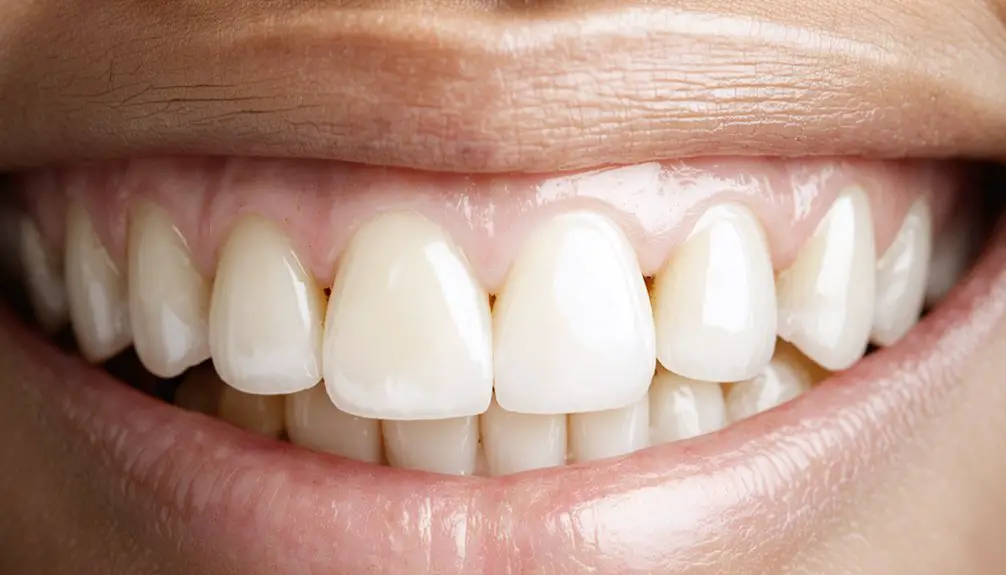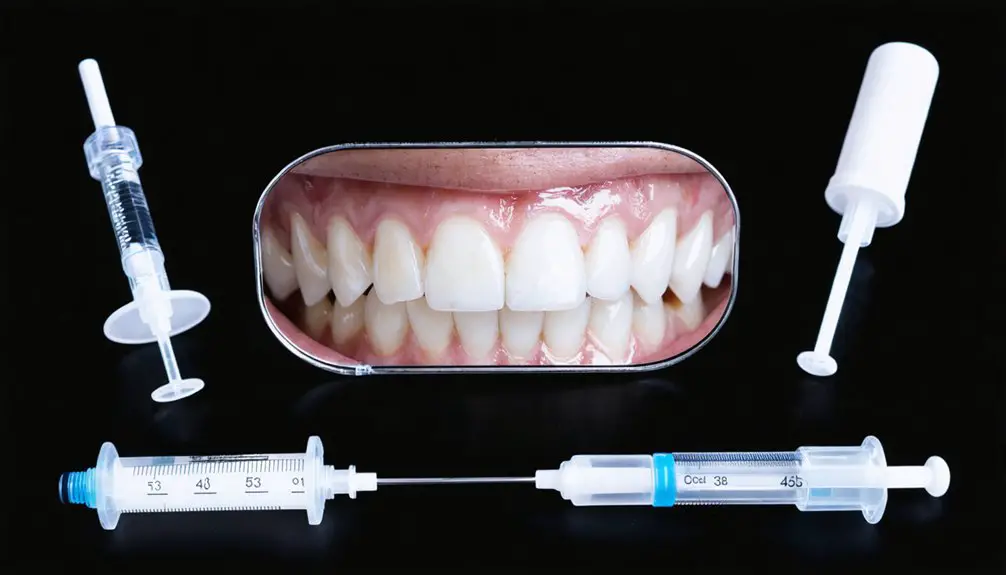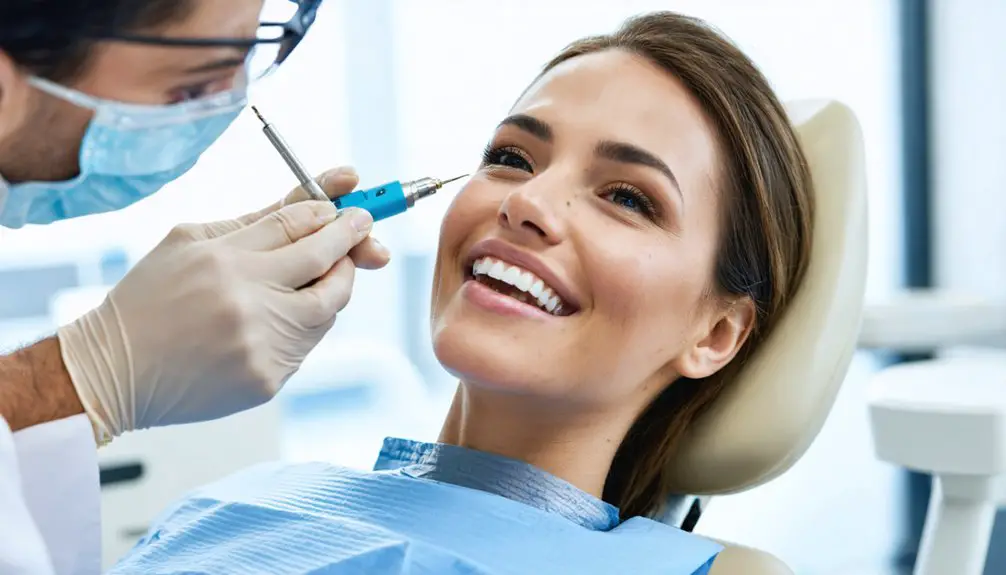When you whiten your teeth, you’ll experience three key oral health benefits. First, you’ll feel more motivated to maintain consistent brushing and flossing routines to preserve your brighter smile. Second, whitening agents help combat harmful bacteria and reduce plaque formation on your teeth’s surfaces. Third, your enhanced smile confidence can improve mental well-being, leading to better overall health outcomes. Understanding these benefits can help you make informed decisions about professional whitening treatments.
Key Takeaways
- Teeth whitening treatments contain antimicrobial agents that fight harmful bacteria and reduce plaque formation in the mouth.
- People who whiten their teeth become more motivated to maintain good oral hygiene through regular brushing and flossing.
- Professional whitening procedures create temporary surface changes that disrupt bacterial habitats and promote tooth remineralization.
- Whitening treatments combat specific harmful bacteria like Streptococcus mutans, reducing the risk of tooth decay.
- Regular dental visits for whitening maintenance lead to better professional monitoring and early detection of oral health issues.
Enhanced Motivation for Daily Oral Care
Motivation serves as a powerful catalyst when it comes to maintaining good oral health after teeth whitening procedures.
You’ll find yourself naturally adopting more consistent oral care routines, including twice-daily brushing with fluoride toothpaste and regular flossing. This heightened commitment stems from your desire to preserve the results of your whitening techniques.
Your improved dedication to dental hygiene extends beyond basic care. The removal of stains during whitening treatments helps prevent future plaque accumulation on tooth surfaces. A professional consultation can help ensure you achieve safe and effective results while minimizing potential risks.
A commitment to dental wellness grows beyond routine maintenance, evolving into a comprehensive approach to lasting oral health.
You’re more likely to schedule regular dental check-ups and professional cleanings, ensuring long-term oral health benefits. The visible results of whitening create a psychological reinforcement that encourages you to maintain these positive habits.
Research shows these behavioral changes lead to reduced cavity formation and decreased gum inflammation, transforming your initial cosmetic investment into lasting health improvements.
Reduced Bacterial Growth and Plaque Formation
While teeth whitening procedures are primarily known for their cosmetic benefits, they also contribute greatly to reducing bacterial growth and plaque formation in your mouth. The whitening agents actively combat Streptococcus mutans and other harmful bacteria through biofilm inhibition, reducing their ability to adhere to tooth surfaces and produce damaging substances. Modern approaches like photodynamic dental therapy have proven especially effective at eliminating harmful bacteria while simultaneously whitening teeth. Carbamide peroxide treatments show remarkable effectiveness in providing antimicrobial properties during whitening procedures.
Your whitening treatment’s antibacterial components, including fluorine and other specialized compounds, create an environment that’s less hospitable to bacteria. These agents modify your tooth surface chemistry and texture, making it harder for plaque to accumulate.
The temporary surface changes also enhance remineralization processes while disrupting bacterial habitats in the pellicle layer. You’ll experience decreased plaque buildup and improved long-term oral health outcomes, especially when combined with proper dental hygiene practices.
Better Mental Health Through Improved Smile Confidence
Confidence radiates through a brighter smile, creating profound effects on your psychological well-being. When you undergo teeth whitening, you’ll experience measurable improvements in self image enhancement and reduced social anxiety. Research shows these benefits can last up to a year after treatment.
Studies indicate that whiter teeth boost both perceived attractiveness and trustworthiness in social interactions. Your enhanced smile aesthetics will boost your engagement in social and professional situations, helping you overcome barriers to public speaking and photography. You’ll find yourself more willing to participate in activities you previously avoided due to dental self-consciousness. Investment in whitening is an investment in long-term self-assurance.
The positive changes extend beyond appearance, reducing psychological distress and promoting mental wellness through increased self-worth. In professional settings, your brighter smile will support more assertive behavior and improve others’ perceptions of your competence, creating opportunities for career advancement and meaningful social connections.
Frequently Asked Questions
Does Teeth Whitening Make Teeth More Sensitive to Hot and Cold Foods?
Up to 80% of patients experience temporary sensitivity. You’ll notice increased hot/cold sensitivity for 24-72 hours after using whitening products, but proper sensitivity management techniques help minimize this common side effect.
How Long Should I Wait After Whitening Before Consuming Staining Foods?
You’ll need to wait 48 hours after whitening before consuming staining foods. For proper post-whitening care, stick to white or light-colored food recommendations until your enamel pores fully close.
Can Teeth Whitening Damage Existing Dental Work Like Crowns or Fillings?
Your teeth whitening won’t damage crowns or fillings since dental work is inert to bleaching chemicals. However, you’ll need to take into account that restorations won’t whiten like natural teeth during treatment.
What Age Is Appropriate to Start Professional Teeth Whitening Treatments?
Like Sarah who waited until 18 for ideal results, you’ll want to follow dental professional recommendations and delay whitening until age 18, though some practitioners may consider treating mature teenagers after 14.
How Often Should Teeth Whitening Treatments Be Repeated for Optimal Results?
For ideal whitening schedule, get professional treatments every 6-12 months. You can maintain results with at-home treatments every 48 hours, spacing maintenance sessions 3-6 months apart based on your needs.
References
- https://pmc.ncbi.nlm.nih.gov/articles/PMC8352057/
- https://pmc.ncbi.nlm.nih.gov/articles/PMC6290526/
- https://www.todaysrdh.com/what-the-research-shows-regarding-the-efficacy-of-dental-whitening-options/
- https://luxurydentistrynyc.com/teeth-whitening-and-oral-health-the-connection/
- https://www.drstanpaloalto.com/blog/teeth-whitening-and-its-impact-on-dental-health/
- https://www.addentistry.com/teeth-whitening/how-teeth-whitening-can-boost-your-confidence-and-oral-health/
- https://www.rollinghillsfamilydentistry.com/teeth-whitening-affects-your-oral-health/
- https://yourauroradentist.com/the-psychological-benefits-of-teeth-whitening/
- https://www.woodburydentistry.com/blog/the-connection-between-oral-health-and-teeth-whitening-what-you-need-to-know.html
- https://onlinelibrary.wiley.com/doi/full/10.1002/advs.202106071



